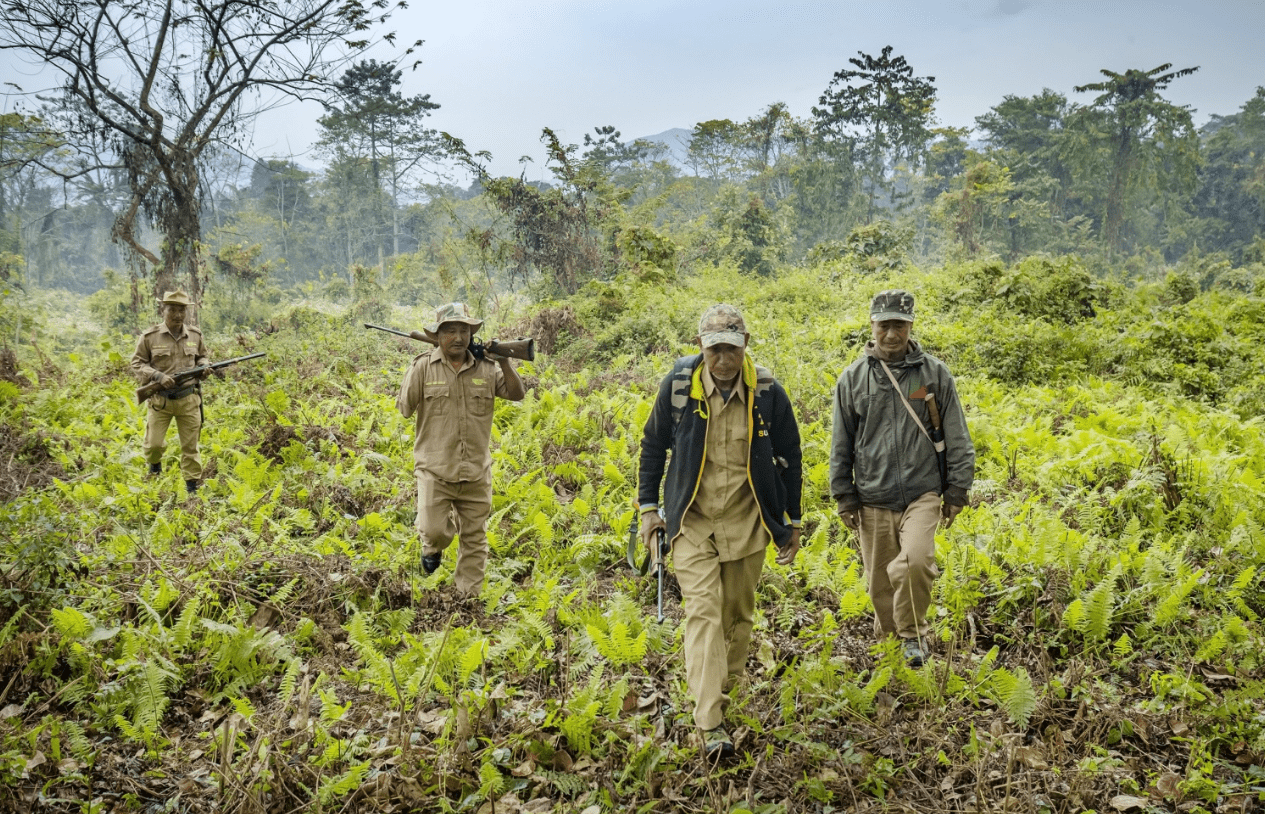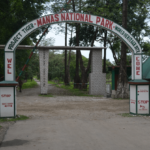Nestled on the outskirts of Manas National Park, the Manas Maozigendri Ecotourism Society is a unique and fascinating place. It is here that I witnessed a remarkable transformation: poachers becoming protectors. While similar examples might exist elsewhere, this experience stands out to me as a powerful testament to human change and resilience.
“He spent 25 years of his life as a poacher, but now, he’s a guardian of the wilderness,” one of the group members said, pointing to an older, seasoned man.
This man’s current life as a protector of wildlife marks his true “heydays.” In today’s world, where tourism is thriving, conserving natural biodiversity has become a significant challenge. The story of the Manas Maozigendri Ecotourism Society (MMES) is particularly inspiring because it showcases how a local community that once exploited the forest now actively works to preserve it.
The Story Behind Manas Maozigendri Ecotourism Society
Manas National Park, a vital green zone in Assam, is one of India’s richest biodiversity hotspots. It was designated a UNESCO World Heritage Site in December 1985. However, the park faced a dark period during the Bodoland movement. The conflict between Bodo rebels and the state government led to lawlessness, allowing illegal logging and poaching to run rampant. Many of the poachers were local villagers who turned to these activities out of necessity. One such individual had even begun poaching at the age of 14 after losing his hand in a wild boar attack. During this time, the park was left unguarded, and poachers operated freely.
The situation deteriorated to the point where UNESCO declared the park a World Heritage Site in danger.
The Emergence of Manas Maozigendri Ecotourism Society
Amidst this turmoil, a group of Bodo youths recognized the importance of conserving forests and wildlife. Hailing from the Chapaguri Koklabari Anchalik Committee in the Koklabari area, they embarked on a mission to protect Manas. They started small, conducting motivational campaigns in areas where poaching and deforestation were prevalent. Despite initial resistance, they eventually succeeded in educating the villagers about the importance of preserving the forest and its wildlife.
Their message was clear: “If Manas is lost, so is Bodoland.”
These youths also appealed to Bodo leaders to take action and presented the idea of transforming Manas into an international tourist destination. Their efforts bore fruit in 2003 when the Bodo Accord was signed, leading to the creation of the Bodoland Territorial Areas Districts and the establishment of Manas as a tourist hub. This marked a significant shift in the Bodo community’s approach, from conflict to conservation.
The Manas Maozigendri Ecotourism Society (MMES) was founded in December 2003, aiming for the sustainable conservation of Manas National Park while promoting ecotourism, peace, and community development.
The Transformation
Starting with limited resources, MMES launched awareness campaigns against poaching and illegal logging. They reached out to the families of poachers, explaining the long-term consequences of their actions. Before long, several poachers surrendered their weapons and joined MMES in protecting the forest. With their help, the society identified danger zones in the forest and resumed patrolling, aided by volunteers.
The Present-Day Manas Maozigendri Ecotourism Society
Today, MMES is responsible for managing about 250 square kilometers of land and employs former loggers and poachers. These individuals now collaborate with forest officials on anti-poaching and anti-logging initiatives. Given their intimate knowledge of the forest and its past poaching activities, they are ideally suited to protect it. Remarkably, none of them have returned to their old ways.
In its early days, MMES faced severe financial challenges. There were times when the guards received no remuneration, only food rations. Despite this, they remained committed to their cause. Today, MMES pays its guards a salary of Rs. 5,000, providing them with both employment and social security. The locals now actively report any suspicious activity in the forest, further aiding in its protection. Over time, many former poachers have joined MMES in conserving Manas.
MMES’s activities have expanded significantly, with 11 protection camps now patrolled by forest guards. The society, with local support, has also constructed a network of roads. Awareness campaigns continue to educate villagers about the importance of conserving Manas National Park’s biodiversity. MMES also assists villagers whose homes and crops are damaged by wandering elephants, helping them rebuild.
Ecotourism at Manas Maozigendri Ecotourism Society
The Manas Maozigendri Ecotourism Society has demonstrated how ecotourism can enhance local livelihoods. Accommodation options include cottages, log huts, tents, and campgrounds. They offer jeep safaris, trekking with community guards, full-moon night safaris, and bird-watching tours. Cultural activities such as village trails and Bodo cultural displays are also organized. The Manas Maozigendri camps are a wonderful place to stay.
MMES’s dream of hosting international tourists has come true, and they are doing incredible work. Much of their funding comes from tourism. The society has received several accolades, including the Anirudh Bhargava INTACH Environment Award (2005) and the Amrita Devi Bishnoi Wildlife Protection Award (2006). MMES is now also associated with the Manas Tiger Project.
Visiting Manas Maozigendri Ecotourism Society
Address: Khamardwisa Lwkhibazar, Baksa (Bodoland), Assam, India.
The nearest airport is in Guwahati. Manas Maozigendri Jungle Camp is located in the Bhuyanpara Range of eastern Manas, near the Kaklabari Central Seed Farm. It is 176 km from Guwahati and takes about 2.5 hours by road. The nearest railhead is at Barpeta Road, 20 km away.
Meeting the people at MMES was a truly humbling experience. One man, who had once killed 25 elephants, now dedicates his life to protecting them. Another forest guard, who lost a hand to a wild boar while poaching, has left his past behind to join MMES. When you visit Assam, I strongly recommend taking the time to visit this place. You’ll leave with cherished memories, and your stay will contribute to the society’s efforts. At a time when wildlife in parts of India is under threat from “so-called royals” and state governments, initiatives like this deserve greater promotion and advocacy.


